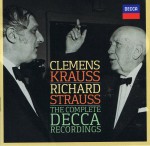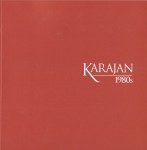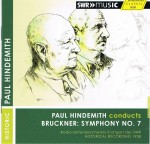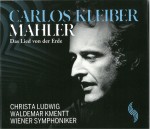 In 2000 Testament issued four CDs of orchestral music by Richard Strauss, recorded by Decca in the Grosser Saal of the Musikverein by the Vienna Philharmonic Orchestra conducted by Clemens Krauss. My excited review of them at the time found these uniquely inspired performances to be incomparable in every respect. Decca has gathered them all together in a compact 5-CD set, Clemens Krauss – Richard Strauss The Complete Decca Recordings (4786493), together with the still talked about 1954 recording of Salome with Christel Goltz, Julius Patzak, Anton Dermota et.al. The Vienna-born Krauss, although he worked through the Nazi era, was not a Nazi. These Strauss performances, writes Nigel Simeone, reveal an interpreter “who understood the importance of transparent orchestral textures, intelligent pacing, a natural sense of line, a fine ear for detail and a clear sense of trajectory.” These qualities are abundant in each of all nine works; Don Juan, Ein Heldenleben, Zarathustra, Don Quixote, Sinfonia Domestica, Le Bourgeois Gentilhomme Suite, Aus Italien, Till Eulenspiegel and Salome.
In 2000 Testament issued four CDs of orchestral music by Richard Strauss, recorded by Decca in the Grosser Saal of the Musikverein by the Vienna Philharmonic Orchestra conducted by Clemens Krauss. My excited review of them at the time found these uniquely inspired performances to be incomparable in every respect. Decca has gathered them all together in a compact 5-CD set, Clemens Krauss – Richard Strauss The Complete Decca Recordings (4786493), together with the still talked about 1954 recording of Salome with Christel Goltz, Julius Patzak, Anton Dermota et.al. The Vienna-born Krauss, although he worked through the Nazi era, was not a Nazi. These Strauss performances, writes Nigel Simeone, reveal an interpreter “who understood the importance of transparent orchestral textures, intelligent pacing, a natural sense of line, a fine ear for detail and a clear sense of trajectory.” These qualities are abundant in each of all nine works; Don Juan, Ein Heldenleben, Zarathustra, Don Quixote, Sinfonia Domestica, Le Bourgeois Gentilhomme Suite, Aus Italien, Till Eulenspiegel and Salome.
Early in the 1950s when these recordings were made, English Decca’s FFRR LPs had already achieved a level of recording excellence unsurpassed by the other companies, thriving in the new, world-wide enthusiasm for classical music, an enthusiasm well supported by the press and dedicated periodicals. People no longer had a record player… they had a hi-fi. Victor Olof, Decca’s head recording producer led the team that documented these Strauss recordings that awed and delighted the music lovers of the day. The inspired and inspiring recordings now find their ultimate realization in this dynamic little set that is the icing on the cake honouring this 150th anniversary year of Strauss’ birth.
 With Karajan 1980s, DG completes its decade by decade re-issue program of their entire library of Herbert von Karajan’s orchestral recordings (4793448, 78 CDs). In that decade Karajan became separated from his orchestra, the Berlin Philharmonic and returned to the Vienna Philharmonic to conduct and make recordings, both audio and video. Which was Karajan’s best decade? The 1960s (DG 47900559, 82 CDs) the 1970s (DG47915775, 81 CDs) or the 80s? The 1960s box witnessed the emergence of Karajan the Superstar and contents include a vast repertoire of Beethoven including his now legendary second complete Beethoven symphonies cycle, a Brahms symphony cycle, Haydn symphonies ... let’s forget the Pachelbel Canon and the Albinoni Adagio. The 70s box had new repertoire and also another Beethoven cycle, a Tchaikovsky cycle, another Brahms cycle, a Second Viennese School collection and some fine Mahler. This new big box of recordings from the 80s contains some daring excursions into new repertoire together with tried and true Beethoven, Brahms, Haydn and the usual suspects. Here we may judge performances of some of these 154 works against Karajan’s own acclaimed versions and I must say that they face some formidable standards. I am informed that the entire production of this limited edition has shipped and is in the hands of dealers around the world. Full details at
With Karajan 1980s, DG completes its decade by decade re-issue program of their entire library of Herbert von Karajan’s orchestral recordings (4793448, 78 CDs). In that decade Karajan became separated from his orchestra, the Berlin Philharmonic and returned to the Vienna Philharmonic to conduct and make recordings, both audio and video. Which was Karajan’s best decade? The 1960s (DG 47900559, 82 CDs) the 1970s (DG47915775, 81 CDs) or the 80s? The 1960s box witnessed the emergence of Karajan the Superstar and contents include a vast repertoire of Beethoven including his now legendary second complete Beethoven symphonies cycle, a Brahms symphony cycle, Haydn symphonies ... let’s forget the Pachelbel Canon and the Albinoni Adagio. The 70s box had new repertoire and also another Beethoven cycle, a Tchaikovsky cycle, another Brahms cycle, a Second Viennese School collection and some fine Mahler. This new big box of recordings from the 80s contains some daring excursions into new repertoire together with tried and true Beethoven, Brahms, Haydn and the usual suspects. Here we may judge performances of some of these 154 works against Karajan’s own acclaimed versions and I must say that they face some formidable standards. I am informed that the entire production of this limited edition has shipped and is in the hands of dealers around the world. Full details at
deutschegrammophon.com/en/cat/4793448.
 In her book On and Off the Record, a memoir of her late husband Walter Legge, Elizabeth Schwarzkopf relates an example of conductor Otto Klemperer’s perverse sense of humour. In the autumn of 1958 Klemperer was too ill to conduct a Beethoven Ninth in London. Against his better judgment, Legge took Klemperer’s earnest pleading to heart and engaged Hindemith as replacement. The performance was a disaster. Legge: “It’s your fault; you insisted that I engage him. I’ll never take your advice about artists again.” Klemperer: “You have been in the music business long enough to know that gloating over the misfortunes of colleagues is the only joy left in life.” Months before that London performance, on June 24, Paul Hindemith had conducted a vital performance of the Bruckner Symphony No.7 with the Stuttgart Radio Symphony in Saxony. Remastered from the original SWR tapes, Hänssler has issued an immaculate recording of that event which clearly demonstrates that Hindemith was more than at home with Bruckner (CD 94.222). It is gratifying to hear that Hindemith had well-defined views and a sense of overriding control of arguably Bruckner’s most beautiful symphony. His reading is at least comparable with any of the strong performances from the 50s including Furtwängler and Jochum, although his sober control is closer to Jochum even though in places where we expect a pause, there is none. The long lines are beautifully spun out and never overindulged. Indeed, the final coda which is usually handled as a blazing apotheosis is achieved in subdued manner so the moment of arrival is realized with a great sense of serenity. The performance is lean which better reveals the structure and sinew of the symphony without sounding at all undernourished.
In her book On and Off the Record, a memoir of her late husband Walter Legge, Elizabeth Schwarzkopf relates an example of conductor Otto Klemperer’s perverse sense of humour. In the autumn of 1958 Klemperer was too ill to conduct a Beethoven Ninth in London. Against his better judgment, Legge took Klemperer’s earnest pleading to heart and engaged Hindemith as replacement. The performance was a disaster. Legge: “It’s your fault; you insisted that I engage him. I’ll never take your advice about artists again.” Klemperer: “You have been in the music business long enough to know that gloating over the misfortunes of colleagues is the only joy left in life.” Months before that London performance, on June 24, Paul Hindemith had conducted a vital performance of the Bruckner Symphony No.7 with the Stuttgart Radio Symphony in Saxony. Remastered from the original SWR tapes, Hänssler has issued an immaculate recording of that event which clearly demonstrates that Hindemith was more than at home with Bruckner (CD 94.222). It is gratifying to hear that Hindemith had well-defined views and a sense of overriding control of arguably Bruckner’s most beautiful symphony. His reading is at least comparable with any of the strong performances from the 50s including Furtwängler and Jochum, although his sober control is closer to Jochum even though in places where we expect a pause, there is none. The long lines are beautifully spun out and never overindulged. Indeed, the final coda which is usually handled as a blazing apotheosis is achieved in subdued manner so the moment of arrival is realized with a great sense of serenity. The performance is lean which better reveals the structure and sinew of the symphony without sounding at all undernourished.
 The late highly esteemed conductor, Carlos Kleiber’s sole performance of any Mahler work took place on June 7, 1967 in the Konzerthaus in Vienna. On the Vienna Symphony Orchestra program was the Mozart Symphony No.33 followed by Das Lied von der Erde with alto Christa Ludwig and tenor Waldemar Kmentt. The orchestra now has its own label on which they have released this Das Lied in quite good mono sound (WS007). We can only bewail that Kleiber’s recorded legacy is so very small due to his famously temperamental approach. He was easily offended and capable of scrapping a well-rehearsed and consummately prepared production in a fit of pique. So it is all the more valuable to have this salvaged and restored archival tape from this source. He brings his vaunted objectivity and clarity of approach to this final word of Mahler’s. It is not usual to describe a performance of this work as refreshing but this is what it is, while doing full justice to the unsparing subject matter.
The late highly esteemed conductor, Carlos Kleiber’s sole performance of any Mahler work took place on June 7, 1967 in the Konzerthaus in Vienna. On the Vienna Symphony Orchestra program was the Mozart Symphony No.33 followed by Das Lied von der Erde with alto Christa Ludwig and tenor Waldemar Kmentt. The orchestra now has its own label on which they have released this Das Lied in quite good mono sound (WS007). We can only bewail that Kleiber’s recorded legacy is so very small due to his famously temperamental approach. He was easily offended and capable of scrapping a well-rehearsed and consummately prepared production in a fit of pique. So it is all the more valuable to have this salvaged and restored archival tape from this source. He brings his vaunted objectivity and clarity of approach to this final word of Mahler’s. It is not usual to describe a performance of this work as refreshing but this is what it is, while doing full justice to the unsparing subject matter.
 “And now for something completely different.” After listening to an endless stream of basic and not-so-basic repertoire, a new disc from Doremi had me sitting up and paying fresh attention to some really stimulating off-beat repertoire played by the legendary pianist Sviatoslav Richter (Volume 23 DHR-8037). The music of Szymanowski is by no means a simple affair. His scores are complex and rich in unique post-Romantic originality which may seem initially foreign to many ears and yet here we have music that is full of surprises and unexpected turns. From our point of view this exciting excursion into new repertoire is actually very rewarding. Heard complete is a recital in Warsaw on November 26, 1982 to commemorate the centenary of the composer’s birth where Richter played the Second and Third piano sonatas and was joined by the great violinist Oleg Kagan playing the exquisite three Mythes Op.30. The stereo sound is of studio quality. I am eager to know these pieces better.
“And now for something completely different.” After listening to an endless stream of basic and not-so-basic repertoire, a new disc from Doremi had me sitting up and paying fresh attention to some really stimulating off-beat repertoire played by the legendary pianist Sviatoslav Richter (Volume 23 DHR-8037). The music of Szymanowski is by no means a simple affair. His scores are complex and rich in unique post-Romantic originality which may seem initially foreign to many ears and yet here we have music that is full of surprises and unexpected turns. From our point of view this exciting excursion into new repertoire is actually very rewarding. Heard complete is a recital in Warsaw on November 26, 1982 to commemorate the centenary of the composer’s birth where Richter played the Second and Third piano sonatas and was joined by the great violinist Oleg Kagan playing the exquisite three Mythes Op.30. The stereo sound is of studio quality. I am eager to know these pieces better.



